HOW THE UNIVERSE WORKS
(c) 2011 Discovery Communications, LLC
|
|
Episodes: |
|
|
| 1 |
Michio Kaku and Lawrence Kraus lead a team of theoretical physicists and cosmologists
who recount the process of the big bang, as it formed space, time, matter,
and inflated the vast universe as we know it from a miniscule point.
This documentary also touches on how we formed such theories,
while the CERN particle accelerator in Switzerland is
used to help explore the properties of early subatomic particles.
|

|
|
| 2 |
Black holes are some of the most powerful and mysterious
phenomena in the heavens. For years they were only speculation,
but now modern astronomy is proving them real and showing
that they may actually shape everything we see.
In this episode, Andrea Ghez shows her proofs of the black hole at the center
of our Milky Way galaxy, and Dr. Shep Doeleman explains how a worldwide network
of radio telescopes might produce our first images of black holes.
|

|
|
| 3 |
[Alien] Galaxies
|
| (43 min.) |
Galaxies, home to stars, planets, and us, come in all shapes and sizes.
Witness the evolution of galaxies, from clouds of cold gas floating in the voids
of space 13 billion years ago, to the magnificent spirals that fill our night sky.
A common pattern for this show's first season debuts here:
The DVD packaging and menus add extra hype after the fact by labeling this episode as "Alien Galaxies",
but the on-screen title is just "Galaxies" which better plays to its simplistic approach to the material.
|

|
|
| 4 |
[Extreme] Stars
|
| (43 min.) |
This is the story of how the universe created stars, and how stars went on
to engineer everything else in that very universe. They changed the universe
by spawning further generations of stars, then planets, and eventually
the building blocks of life.
See the incredibly powerful and dangerous machines scientists have built
to recreate some of the conditions of stars here on Earth, including
contained nuclear fusion, magnetic field interference tests,
and supernova-imitating laser combustion.
|

|
|
| ------ Disc 2 ------ |
| 5 |
There are just eight planets in our solar system, but there could be a hundred billion planets in our
Milky Way galaxy alone. This show follows the journey of planets as they grow from grains of
dust to the magnificently diverse worlds we see today.
(c) 2010
|
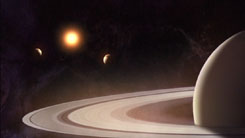
-
more details
|

|
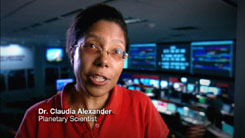
|
| 6 |
Stars are not eternal; they are dying in unimaginably large explosions called supernovas. Second only
to the Big Bang, these explosions are where creation and destruction meet. Only now have we
begun to understand how these wonders in our sky work.
This episodes details how various atomic elements, on beyond iron, are created in
different types of stars, the various types of corpses (pulsar, magnetar, white dwarf,
black hole) that are produced by supernovae of different sizes, and the details
of Type 1A supernovae that made them ideal as a standard candle of astronomical measurements.
(c) 2010
|

|
|
| 7 |
Is our solar system unique? Since the first discovery of a planet orbiting another star, some 280 alien
solar systems have been identified. It's only by looking at solar systems far beyond our own that
we can understand how remarkable our universe is.
(c) 2010
|
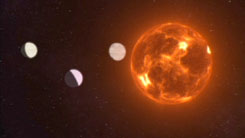
-
more details
|

|
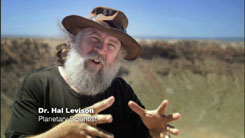
|
| 8 |
Moons come in every possible shape and size. Home to incredible natural phenomena like gigantic
geysers and colossal volcanoes, moons also offer perhaps the best chance of finding alien life in
the universe - and they probably exist in the billions.
The DVD packaging and menus label this episode as "Alien Moons",
but the on-screen title is just "Moons".
(c) 2010
|
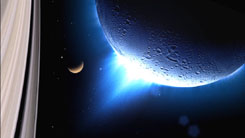
-
more details
|

|
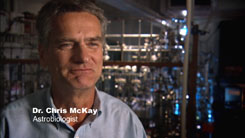
Dr. Chris McKay, Astrobiologist:
"There may be more habitable moons in our galaxy
than there are habitable planets.
...I'm for moons; you can keep the planets."
|
|
|
| 9 |
Scientists are discovering volcanoes on worlds we once thought dead.
From our nearest planetary neighbour to tiny moons billions of miles away,
today we are discovering volcanoes on alien worlds.
Are these worlds where, tomorrow, we might find life?
|
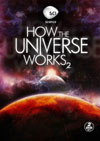
|
|
| 10 |
On Earth, violent and destructive storms create new opportunities for life.
In our quest to discover if we are alone in the universe,
we shouldn't just look for worlds, we should look for weather.
Find chaotic weather and maybe we will find alien life.
|

|
|
| 11 |
Planets from Hell
|
| (44 min.) |
Over the last twenty years we have discovered an extraordinary zoo of
planetary nightmares outside our own solar system, all of them truly wild worlds,
a collection of monsters. Now we must face the question:
Is every planet out there a planet from hell?
|

|
|
| 12 |
The Universe is a magnetic minefield. The Sun spits out flares
capable of battering life on Earth. But out there in space lie
the true magnetic monsters. As we uncover dangerous megaflares in the cosmos,
the question is, will we end up in the firing line?
|

|
|
| 13 |
The only reason life on Earth is possible is because of our stable orbit around the Sun.
Elsewhere in the Universe, orbits are chaotic, violent and destructive.
On the largest scale, orbits are a creative force and construct the fabric of the Universe.
|

|
|
| 14 |
We follow the odyssey of a comet as it sails through space,
watching every move as it evolves from a chunk of ice and rock
into an active nucleus engulfed in a gaseous haze.
What we learn is a revelation; comets are even more mysterious than we imagined.
|

|
|
| 15 |
From icy worlds with more fresh water than Earth to flying mountains of pure metal,
asteroids shaped our past and promise much for the future.
Could these enigmatic space rocks hold the key to how life in the Universe arises
and is extinguished?
|

|
|
| 16 |
Birth of the Earth
|
| (44 min.) |
The Earth was formed by a series of cosmic cataclysms including the most powerful blast
in the Universe. Yet amid the turmoil our world was born.
Could the same chain of events have created other earths elsewhere, inhabited by creatures like us?
|

|
|
|
|
| 17 |
How does light escape from the sun? We take a journey from the centre of the sun,
following the path of light. We witness its fiery birth from in the core,
its 430,000 mile battle against gravity and magnetism,
and its escape from the solar surface.
|
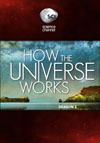
|
|
| 18 |
End of the Universe
|
| (44 min.) |
|

|
|
| 19 |
|

|
|
| 20 |
The first second of the Universe, the creation of everything
when space, time, matter and energy burst into existence.
It is the most important second in history, which seals
the Universe's fate and defines everything that comes after - including us.
|

|
|
| 21 |
|

|
|
| 22 |
|

|
|
| 23 |
|

|
|
| 24 |
One day, a cosmic disaster will make life on Earth impossible.
To survive, we must find a new home amongst the stars.
Scientists are already developing new propulsion systems
to take us to these distant worlds.
|

|
|






































